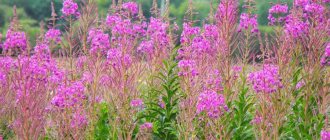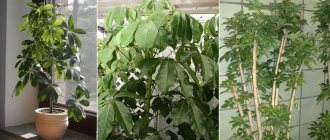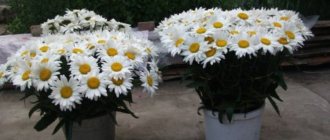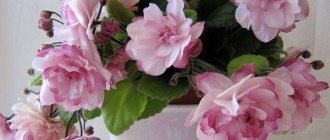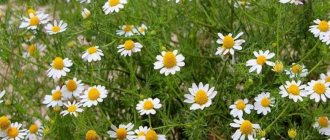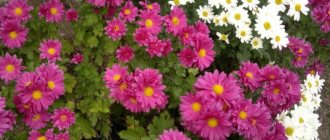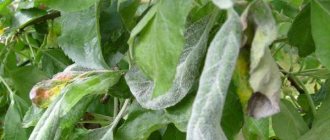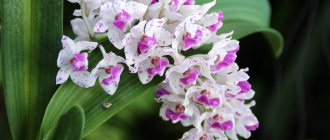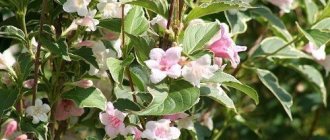Review author: Terrari School of Design
Erigeron, also called small sandweed, is considered a member of the aster family. The name of the plant translates as “early old man.” The reason is the rapid maturation of the seeds, forming a grayish tuft.
Erigeron is also planted for decorative purposes. Therefore, it is worth considering how to grow this flower from seeds and how to properly care for it.
Description of the plant
The flowers of Erigeron amaze with their diversity. They are represented by annuals, biennials and perennials. They are represented by rhizomatous herbs or subshrubs resembling asters.
Depending on the variety, single flowers or inflorescences may form on the shoots of Erigeron. Elongated petals form a single-row or fluffy calyx in white, pink, lilac, blue or yellow. The core of the flower is often painted a rich yellow color.
Botanical characteristics
Due to the large number of needle-shaped or reed petals, the plant received a second name - small-petalled. “Erigeron” is translated from Greek as “early old man,” which is explained by the early ripening of seeds.
The plant forms loose spherical bushes with a large number of branched shoots. The average height and width of the bush is 40-60 cm. The shoots are herbaceous and soft. The greens are a rich dark green color.
The bush is evenly covered with baskets of flowers, single or collected in sparse paniculate inflorescences. Petals are multiple and multicolored. There are flowers of pink, purple, lilac, white, blue, yellow and other shades. The petals can be arranged in several rows (terry varieties) or in one row (simple). The core of the flower is lush and yellow. The baskets differ in size; flowers of 2 and 4 cm are found on one plant. Flowering occurs from June to October. Then small pubescent seeds form in the capsule.
Lanceolate leaves cover the entire stem; basal rosettes consist of more rounded leaves.
Popular varieties
A variety called Pink Lotus is often grown in garden plots. This coloring is considered the most elegant. In addition, the following types of Erigeron are grown:
- The small petal is a beautiful perennial plant with a horizontal rhizome and shoots reaching 70 cm in height. The first flowers appear on them in July or August, and the total flowering duration is about a month. This species includes several varieties that differ in flower color.
- Small-petalled Karvinsky. This plant originally grew in Central America as a weed. And relatively recently it was introduced as a garden flower. Although it has not yet gained popularity, it attracts with its compact size and unpretentiousness, allowing it to be grown in hanging structures and other containers.
- Erigeron is orange, attracting with the rich color of the inflorescences of the baskets. The plant's homeland is considered to be China or Central Asia.
- The alpine variety is also a perennial plant. It is valued for its delicate pink-lilac flowers, as well as for its earlier flowering, which starts in the second half of June and lasts for a month and a half.
Some Erigeron species are not grown for ornamental purposes. Thus, the Canadian small petal is considered as a medicinal plant, popular in alternative medicine.
Varieties
Karvinsky
The most popular plant species that are often grown in Russian gardens include the following:
- Karvinsky is the most common variety. The height of the bushes of the plant does not exceed 15 cm. But the bushes grow in width to half a meter or more. The flowers of this species are also amazing. After the flower opens, the petals have a pale pink tint. Then they become almost white in color. And at the very end of ripening they turn pink or even crimson again. Since all the baskets do not open at the same time, the bushes are covered with numerous colorful flowers;
- Pink Diamond is another equally popular variety for garden growing. The bushes are of medium size. The lateral stems are creeping, so to give the bushes the correct shape they need to be tied up. The flowers are bright and double. The color of the petal is rich pink with a purple tint;
- Treasures of Agra is a spectacular, frost-resistant variety. The height of the bush reaches half a meter or more. The inflorescences are small. The core of the flower is yellow. The color of the petals is varied;
- Pink treasure is a tall (up to 70 cm) variety of Erigeron. Double flowers. The color of the marginal petals is pink or crimson. Flowering occurs in June-July and repeats in early autumn.
Growing from seeds
The timing of planting Erigeron is determined by climatic conditions in a particular region. They begin to germinate seeds for seedlings in February or March. Sowing in open ground is not practiced.
Erigeron seeds do not have good germination. Therefore, in order to get a lush flower garden, you should not skimp on the amount of planting material. First you need to prepare a container with a moistened substrate. Seeds are placed here by pressing them into the soil to a depth of 5 mm.
Now you need to take care of the correct ratio of temperature and humidity. Drought and overwatering are equally dangerous for seedlings. Therefore, the gardener will need to periodically moisten the soil without extremes.
Optimal conditions for the development of seedlings are at a temperature of 13 degrees. Therefore, containers are often sent to a window or balcony, protected from direct sunlight. To protect the shoots from frost, they are covered.
Strengthened seedlings are planted in open ground. In order for the shoots to become more comfortable after transplantation, in the first year they are covered at night, protected from frost. If everything is done correctly, the plants will delight you with flowers the next season.
Landing Features
Although Erigeron is not a capricious plant, several factors should be taken into account when planting it:
- flowers prefer well-lit areas of the ground;
- the bushes move along with a lump of earth to protect the roots;
- disembarkation is carried out maintaining a distance of 25-30 cm
After planting, it is worth sprinkling the seedlings with mulch to create optimal conditions for them. It is worth considering that flowers can grow safely in one area for up to five years. Therefore, they do not need frequent transplantation.
In landscape design
The plant is gaining increasing popularity among landscape designers. In the spring, with the help of its green shoots, primroses are successfully shaded, and in the fall, it will highlight borders and ridges with its numerous blooms. Even in winter, these colorful bushes will wink with green stems from under the snow cover. You can often find small petals among mixed borders, in rocky areas and different types of flower beds. The most suitable neighbors for it are elecampane, geranium, liatris, heuchera and speedwell.
Collection of raw materials
It contains the most healing substances when it begins to bloom. And it must be prepared precisely at this time. Experienced herbalists recommend collecting the grass when it has reached more than 10 cm in height. In tall bushes, only the tops are cut off, without the woody stem.
The cut small petals are laid out in bunches and tied. Be sure to dry them away from the sun - otherwise most of the beneficial substances are destroyed. It would be ideal to hang the bunches in a draft under a canopy. For medicinal purposes, flowers and other parts of the plant are often used separately, so after drying they can be torn off and stored separately.
Reproduction through dividing the bush
This method is considered more popular and productive than growing from seeds. The procedure is performed according to the following scheme:
- a bush is dug up;
- the root system is divided into several parts;
- the resulting plants are planted in the ground.
This way you can wait for flowering faster. However, it is applicable if mature plants are already available.
Application
Small petal has won its place in folk medicine and homeopathy in different countries; it is most popular in America.
Water and alcohol tinctures, decoctions prepared from the herb are used as a medicine for diarrhea, for hemorrhoidal, uterine, pulmonary and kidney bleeding, to improve vision, for cystitis, prostatitis and gout, and even as a means of protection against poison. They are also an ingredient in the kinnikinnick smoking blend.
People call this “antidiarrheal plant” quite funny - “close the hollow”, “shut the goose”.
The leaves, stems and flowers of the small petal contain many essential oils, such as linalool and limonea. Thanks to them, the plant has a subtle citrus aroma and gives it powerful anti-inflammatory properties.
In addition, the herb is used for:
- bruises and swelling;
- cough;
- dysuria;
- chronic urethritis;
- gonorrhea;
- hematocele;
- bleeding;
- hemorrhoids;
- placenta previa;
- non-healing wounds.
The plant contains caffeic acid, which is an active compound that has antioxidant and neuroprotective effects on neuronal cells.
Homeopathy produces a fairly effective drug “Erigeron Canadensis”, which is prepared from flowers. Use it diluted in D3-D6 for uterine bleeding.
Pharmacy chains sell dietary supplements and tinctures based on the plant.
Rules of care
Caring for Erigeron seedlings includes:
- Periodic watering. In rainy summers, plants will have enough natural precipitation.
- Loosening, which will provide air flow to the roots and also protect against diseases.
- Periodic weeding.
- Feeding, which is not considered a mandatory event, but is required to obtain more luxuriant flowering. It is recommended to apply complex mineral fertilizers here.
When growing perennial plants, preparation for winter is important. To do this, after the end of flowering, the above-ground part is removed. And before the onset of cold weather, it is recommended to cover the bed. Dry grass or foliage is used as a “blanket”.
It is recommended to update plantings every 3-4 years. To do this, adult bushes are propagated by division, and then planted in a new area.
Usage
The small petal plant takes root well as an hanging plant. Suitable for decorating balconies, verandas or flowerpots near the porch. Low bushes are used in the design of ridges, rock gardens, and mixborders.
The plant is preferably used for the foreground, as well as edging lawns and areas near paths. With the help of compact shoots with multi-colored buds, you can create decorative compositions in your own summer cottage. Even a novice gardener can create curved lines or small pictures.
Diseases and pests
Planting and caring for Erigerona in open ground is not without difficulties. Thus, high humidity can lead to the spread of fungal infections. It manifests itself through dark burgundy spots on the leaves.
You will need to treat the plantings with a one percent Bordeaux mixture. The procedure is performed 3-4 times with an interval of one and a half weeks. In case of severe damage to plants, the above-ground part is removed.
Let's summarize: according to the description, Erigeron is represented by many varieties that differ in their homeland of growth, life expectancy, appearance and flowering time. And all of them are united by unpretentiousness, resistance to most diseases and ease of cultivation.
Possible problems
Erigeron is an easy crop to grow. Owners have virtually no problems with this plant.
A rare problem is the appearance of brown spots on stems and leaves. The reason is an excess of moisture in the soil.
In addition, the plant is quite problematic to propagate by seeds. Firstly, the seeds have low germination, and secondly, the seedlings are very fragile and thin, they are easy to damage.
Erigeron is an unpretentious and spectacular plant that will decorate the garden plot with its bright flowers. Culture is successfully used in landscape design. The plant is easy to grow and maintain with minimal care.
